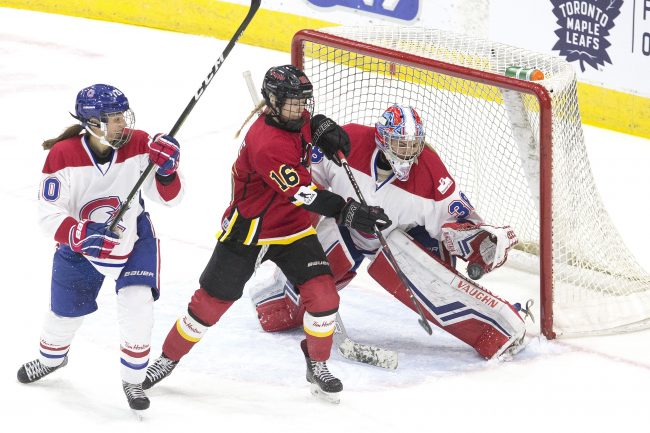The National Women’s Hockey League is moving swiftly to expand to Toronto and Montreal following the demise of its Canadian-based rival.

NWHL Commissioner Dani Rylan told The Associated Press on Tuesday the league’s board had approved an investment plan to establish teams in Canada’s two largest cities for the start of next season. Rylan also said her league has received a commitment from the NHL that will make it one of the NWHLs biggest financial sponsors.
READ MORE: Canadian Women’s Hockey League folding due to financial woes
The decision by the U.S.-based NWHL to cross the border and expand from five teams to seven comes just two days after the Canadian Women’s Hockey League abruptly announced it will cease operations by May 1 due to financial issues. The CWHL had four teams in Canada, one in suburban Boston and a sixth in China, and its decision after 12 seasons was seen as a major blow to the sport.
“The news definitely came as a shock to us on Sunday morning, but it was obvious that we needed to do what we could to provide for those players to have a place to play this fall,” Rylan said by phone. “The focus of ours was to figure out a solution for Canada first, and we’re fortunate we were able to do that pretty quickly here.”
Rylan said the expansion decision and NHL’s increased backing weren’t exactly connected. She instead views the NHL’s increased financial support as “an endorsement of our business and the brands that we’re growing.”
READ MORE: Demise of CWHL casts doubt over future of women’s hockey in North America
Rylan did not reveal how much additional money the NWHL will receive above the NHL’s $50,000 previous annual commitment. The NHL also contributed $50,000 to support the CWHL.

Get breaking National news
NHL deputy commissioner Bill Daly confirmed the league has increased its financial support. Daly, however, cautioned the additional support doesn’t change the NHL’s position in fully backing a women’s pro sports league.
Daly referred to what he wrote on Sunday in response to the CWHL’s collapse.
“We recognize the importance of women having options to play the game at the professional level. If those options were to become unavailable in the future, we would certainly consider doing what’s necessary to fill that void,” Daly wrote.
“But that’s not the case currently.”
NHL Commissioner Gary Bettman previously told The AP he was hesitant about the league assuming control of the CWHL or NWHL or both because, as he put it, “we don’t believe in their models.” At the time, he emphasized the importance of starting with a clean slate.
The CWHL operated liked Major League Soccer by owning each of its teams, except for the one based in Shenzhen, China. Starting in 2017-18, it began paying player salaries ranging from $2,000 to $10,000 out of a total budget of $3.7 million. The NWHL has relied on private investors and was the first to pay players a salary.
The shifting fortunes for pro women’s hockey in its hotbed of North America has come with most of the world’s top players in Finland for the world championships, which open on Thursday. Many players tweeted their disappointment on Sunday and Canada’s national team issued a statement Tuesday.
“We are disappointed and shocked to learn of the CWHL’s plan to shut down league operations,” the team said. “There are many unanswered questions about the future, but we will continue to create dialogue with our teammates, fellow players and leagues. Our priority as players is to move forward and advance the game at all levels, and to ensure female hockey players have a viable league for the future.”
CWHL Calgary general manager Kristen Hagg posted a statement on her Twitter account saying former league officials continue “evaluate all the options on the table and plan to work in solidarity.”
WATCH: #NoLeague for women’s hockey in Canada

The statement adds there are no talks taking place between former CWHL teams and the NWHL.
Rylan previously had merger discussions with CWHL officials in a bid to form one North American league rather than have two leagues competing for the same pool of sponsorship money and investor backing.
With the CWHL ceasing operations, Rylan said she can now work to fulfilling the vision she had when establishing the NWHL in 2015.
“A lot of stakeholders and brands have been hesitant to invest in women’s hockey because there was a decision to make before, the CWHL or NWHL,” Rylan said.
“And now there’s no decision,” she added. “We are the league to do business with and we are continuing conversations and exploring conversation, and eager to accept that business this off-season.”
Without going into detail, Rylan didn’t rule out the possibility of adding more expansion teams before the start of next season.





Comments